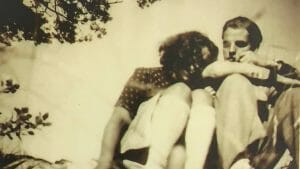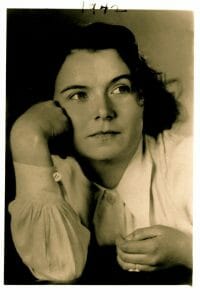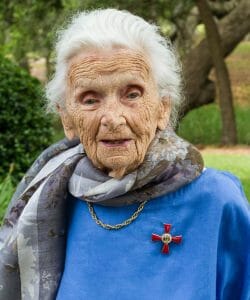
The youngest of three girls born in Hamburg, Germany, Lafrenz’s father was a civil servant, and when she graduated school she studied to be a doctor. But World War II interrupted everything. She started going to meetings of the Weiße Rose (White Rose). The group’s name was meant “to represent purity and innocence in the face of evil,” and worked as a non-violent, intellectual resistance group in Nazi Germany. It was led by five medical students, and philosophy professor Kurt Huber, at the University of Munich, where Lafrenz was studying. She started dating one of the founders, student Hans Scholl; he and his sister were the main leaders of the group.

The Nazis didn’t think much of their efforts: within months, three of the founders — including Scholl and his sister, Sophie — were arrested, pushed through a show trial without being allowed to speak, and sentenced to death. Four days after their arrest, they were executed by guillotine. Es lebe die Freiheit! (Let Freedom live!) were Scholl’s last words. Lafrenz was the only one other than their family brave enough to go to the funeral. The remainder of the White Rose group, with occasional new members (totaling about 60), mostly worked by printing leaflets in opposition to the war. Lafrenz was naturally quite motivated to help distribute them, and helped provide printing equipment to make them at a bookstore; she knew its owner, who was gay and thus also a target of the Nazis and their “final solution.”
Their first leaflet denounced the Nazi regime’s crimes and oppression, and called for resistance. Their second leaflet openly denounced the persecution and mass murder of Jews — among the first warnings of the Nazi-led holocaust. “We will not be silent,” a leaflet warned. “We are your bad conscience. The White Rose will not leave you in peace!” Lafrenz personally took the third flyer to Hamburg for distribution there. She also traveled to Stuttgart to pick up a duplicating machine, successfully delivering it back in Munich. She kept her ears open, and warned people who were about to be arrested. “Later, I destroyed incriminating material.”
Lafrenz was arrested, but managed to convince the Gestapo that she was not involved with the leaflets. After she was released, she was quickly arrested again; they probably got new information. A show trial was scheduled which would almost certainly lead to her death — but Allied troops liberated the prison where she was held three days before her trial was supposed to commence. Only eight White Rose resistance members were executed. In 1947, Lafrenz went to the United States to resume her medical studies, in San Francisco. She met Vernon Page at the school. He became an eye surgeon; she a general practitioner. They married in 1949 and moved to Evanston, Ill., where she headed a private school for developmentally disabled students. Vernon died in 1995, and Traute moved to live with her daughter in South Carolina.

In 2019, Lafrenz was presented with the Order of Merit (1st Class), the Federal Republic of Germany’s highest honor for civilians. It was presented at her home in South Carolina by Consul General Heike Fuller on her 100th birthday. Lafrenz “belonged to the few who, in the face of the crimes of national socialism, had the courage to listen to the voice of her conscience and rebel against the dictatorship and the genocide of the Jews,” said the Order’s citation. “She is a heroine of freedom and humanity.” Dr. Traute Lafrenz Page died at her home on March 6, at 103, and was the last surviving member of the White Rose.
